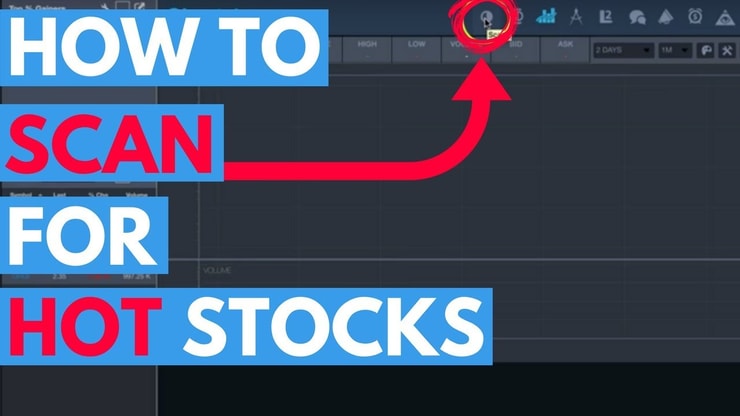The best growth stocks to buy in 2023 belong to businesses with sales growth even in times of inflation. Their sales performance grows even as mortgage rates climb, and their upside remains on target even if other securities in their segment take a hit. Their fundamentals reassure shareholders even as news and online opinions bring in a steady stream of new traders.
Keep growing until you become the next Microsoft (NASDAQ: MSFT). That’s the dream, right?
For traders, it isn’t that simple. (I don’t think it’s simple for blue-chip investors either — just check out AMZN’s brutal 2022 chart!)
We don’t care about a stock’s five-year chart — we want to see the prices of shares increasing in a shorter timeframe. This doesn’t usually have much to do with overall market advantages or a bump in returns…
Successful trades happen on the margins of market moves. We’re looking for different types of data, like trading volume. The tools we use measure momentum, not cash flow or analyst recommendations.
Every trader wants to find stocks that offer the potential for growth. However, finding stocks that are both tradable AND offer growth potential can prove tricky. What indicators should you look at, and what types of stocks might offer the best returns?
Table of Contents
- 1 What Is a Growth Stock?
- 2 How Do Growth Stocks Work?
- 3 What Types of Companies Are Classified as Growth Stocks?
- 4 Difference Between Growth Stocks vs. Value Stocks
- 5 Evaluating a Company’s Potential for Growth
- 6 Benefits of Trading High-Growth Stocks
- 7 Top Growth Stocks to Buy in 2023
- 7.1 Tesla Inc. (NASDAQ: TSLA) — The Exponential Growth Stock
- 7.2 Apple Inc. (NASDAQ: AAPL) — The Growth Stock You’d Buy if You Had a Time Machine
- 7.3 NVIDIA Corporation (NASDAQ: NVDA) — The Hot Growth Stock
- 7.4 Netflix Inc. (NASDAQ: NFLX) — The Hot Growth Stock in Recovery
- 7.5 Amazon.com, Inc. (NASDAQ: AMZN) — The 20-for-1 Split Growth Stock
- 7.6 Alphabet Inc. (NASDAQ: GOOGL) — The Other Growth Stock Split
- 7.7 Microsoft Corp. (NASDAQ: MSFT) — The AI Growth Stock
- 7.8 Meta Platforms (NASDAQ: META) — The Metaverse Growth Stock
- 7.9 Visa Inc. (NYSE: V) — The Growth Stock Near All-Time Highs
- 7.10 Advanced Micro Devices, Inc. (NASDAQ: AMD) — A Slightly Cheaper Growth Stock
- 8 What Is a Good Growth Investment?
- 9 How To Find And Trade Growth Stocks
- 10 How to Apply Growth Investing Strategies
- 11 Essential Rules for Long-term Investing
- 12 How to Choose Growth Stocks
- 13 Identify Trends and the Companies Driving Growth Stocks
- 14 The Bottom Line
What Is a Growth Stock?

A growth stock is pretty much just what it sounds like: a stock that has potential for future growth.
Defining a growth stock can still be confusing. Let’s get into it…
How Do Growth Stocks Work?
Growth stocks are the stallions of the stock market, companies that exhibit above-average growth in earnings. They’re typically devoid of dividends, opting instead to reinvest profits into their businesses to fuel further growth. This sets up a potential scenario for high returns if you catch the wave right. But remember, it’s not always smooth sailing, markets are influenced by a myriad of factors and volatility can be a regular visitor.
But caution doesn’t mean you shy away. If done right, you can gain a significant edge. You just need to understand the inner workings of this realm, the impact of market dynamics, and industry trends.
What Types of Companies Are Classified as Growth Stocks?
Remember, growth stocks are typically firms that are expected to grow significantly above market average for a certain period. So, where do you find these? In industries that are experiencing or are expected to experience rapid growth. Think innovative sectors: technology, biotech, fintech. But remember, a company’s classification as a growth stock can change as situations evolve. Stay alert.
Also, don’t be fooled by the flash. High-growth companies often come with lofty valuations. When you spot a high P/E ratio, it’s not always a ticket to easy profits. It’s about understanding the potential behind the figures, about assessing whether the price is justified by the potential earnings growth.
Growth stocks are a great way to potentially increase your portfolio’s value, but they’re not the only game in town. Blue-chip stocks, the stalwarts of the market, can also provide steady growth and stability. These are the big-name companies that have stood the test of time. Want to learn more about this investment strategy? Take a look at this guide on investing in blue-chip stocks.
Difference Between Growth Stocks vs. Value Stocks
A lot of traders have trouble telling the difference between value stocks vs growth stocks. Before you move on to the watchlist, let’s talk about exactly what we’re watching…
Growth Stocks
As the name implies, growth stocks are stocks that are seen as having potential for future growth.
These companies might be growing at exponential rates. They’ve garnered the attention of investors and analysts. Their stock outperforms the market, or may have the potential to outperform it in the future.
Usually, these companies are very focused on growing, and will re-invest their revenue into expanding. Their services might be expanding, and sales estimates could be on the rise.
There are some sectors that are known for growth stocks, such as the tech sector. But growth stocks can be found in just about every sector. There are even ETFs dedicated to growth stocks, like the Vanguard S&P Small-Cap 600 Growth Index Fund ETF (NYSEARCA: VIOG).
While growth stocks are often attached to revolutionary companies, it’s not always the case.
For instance, Amazon can be (and often is) considered a growth company. Even though it’s basically a retailer, it continues to innovate and revolutionize the way we look at retail. This goes to show that there can still be plenty of room for growth even in traditional sectors.
Value Stocks
Value stocks are stocks that are currently undervalued. As the name implies, they’re being offered at a very good price, and this price may be poised to increase in the near future.
Some investors view value stocks as the equivalent of mutual funds, CDs, or real estate — you know, “safe” investments. But there are two problems with this strategy.
First, not every value stock will prove to be a gainer.
This means that if you want to buy value stocks, you have to hit your research even harder to figure out which stocks are worth your time.
But here’s the big one:
I'm sick of what the suits say you can/cannot trade, what strategy you can/cannot use. Value investing is nice if you want to make $ over decades, but if you have $1k-$20k to your name, it's useless so speculative strategies CSN BE BETTER! #wallstreebets #dogecoin $GME $AMC $KOSS
— Timothy Sykes (@timothysykes) January 29, 2021
Most investors would be content with an annual return of 10%. If you don’t have much money in your account, your purposes are probably different…
Those kinds of small additions won’t do much if the interest rate on your credit cards is 24%.
If you want to learn more about my trading strategy, check out my Trading Challenge. That’s where I teach my growth-minded approach to trading, give webinars, share my daily watchlists, and more!
Apply to my Trading Challenge here.
Evaluating a Company’s Potential for Growth
On to evaluating a company’s potential for growth. It’s not as daunting as it sounds. This is where you do your homework, your due diligence. It’s not just about gazing at numbers. We’re talking about the story behind those digits.
Sure, you could take loans out and throw money at stocks hoping they stick, but is that a strategy you can stick with? I think not. We’re in this for the long haul, to secure retirement, not to make mortgage lenders rich with our hard-earned money.
Look at competitors within the industry. Some firms like to play it safe, others are the trailblazers, the disruptors. You want to spot those innovators, those front-runners. They’re not just following the trends — they’re the ones setting them.
More Breaking News
- Archer Aviation’s Unexpected Surge: What’s Fueling the Takeoff?
- How Nano Nuclear Energy’s New Acquisition is Powering a Stock Surge
- Growth or Bubble? Dissecting the Surge of Centrus Energy Corp.
Strong Historical Earnings Growth
Before jumping headfirst into a potential growth stock, check out the company’s earnings track record. Has it been growing its profits at an above-average rate? If the answer is yes, it could be a good sign. Remember though, past performance isn’t always an indicator of future success, it’s one piece of the puzzle.
Large-cap stocks, those with a market capitalization of $10 billion or more, can offer a balance of growth and stability. They’re often industry leaders and can provide consistent returns. Interested in exploring this further? Check out this article on investing in large-cap stocks.
Strong Forward Earnings Growth
Now, onto the next step — future earnings. Market analysts and portfolio managers are often good sources for estimates. If there’s a consensus that the company’s earnings are set to grow significantly in the future, you might be looking at a solid growth stock. However, don’t hang your hat solely on other’s predictions. Make your own assessments too.
Strong Profit Margins
When evaluating a company, don’t just look at the earnings, scrutinize the profit margins too. A company with strong profit margins has more financial flexibility, can withstand competition better, and has a higher likelihood of generating profits in the future.
Strong Return on Equity (ROE)
Return on Equity is a valuable metric in your toolkit. It measures how well a company uses investments to generate earnings growth. A strong ROE often implies effective management and could signal a potential growth stock.
Strong Stock Performance
One final piece in your evaluation arsenal should be stock performance. A growth stock often exhibits a strong upward trend. Yet, be wary of overextended stocks, they might be nearing their peak.
Benefits of Trading High-Growth Stocks

Here are some of the benefits of trading growth stocks:
- Growth. Really, one of the biggest draws is right there in the name. Growth stocks are appealing because they are companies that are expected to grow, usually at an above average rate.
- A promising future. Part of a growth stock’s benefit is that they promise to offer handsome rewards down the line. A smaller company now might become an industry leader later.
Or a small company with an innovative product or service might be acquired by a bigger company later, letting its shareholders cash in.
- A slower pace. Day trading, with its fast pace, isn’t for everyone. With growth stocks, traders have the opportunity to approach trades in more of a swing trading state of mind.
You can set entry and exit points that don’t require following the ticker down to the second, and your holds are typically longer.
Top Growth Stocks to Buy in 2023
Here are my top growth stock picks for 2023:
- (NASDAQ: TSLA) — Tesla Inc. — The Exponential Growth Stock
- (NASDAQ: AAPL) — Apple Inc. — The Growth Stock You’d Buy if You Had a Time Machine
- (NASDAQ: NVDA) — NVIDIA Corporation — The Hot Growth Stock
- (NASDAQ: NFLX) — Netflix Inc. — The Hot Growth Stock in Recovery
- (NASDAQ: AMZN) — Amazon.com, Inc. — The 20-for-1 Split Growth Stock
- (NASDAQ: GOOGL) — Alphabet Inc. — The Other Growth Stock Split
- (NASDAQ: MSFT) — Microsoft Corp. — The AI Growth Stock
- (NASDAQ: META) — Meta Platforms — The Metaverse Growth Stock
- (NYSE: V) — Visa Inc. — The Growth Stock Near All-Time Highs
- (NASDAQ: AMD) — Advanced Micro Devices, Inc. — A Slightly Cheaper Growth Stock
What are some of the characteristics of a high-growth stock? This growth stocks list offers some great examples…
Take note: I probably won’t be trading these stocks. These are higher-priced stocks than I normally trade…
Plus — watchlists are only for watching! Don’t take any stock picks as advice to trade.
Building and maintaining watchlists is one of the most crucial parts of becoming a self-sufficient trader. You have to be watching for opportunities.
So let’s get on with it! Here are the best growth stocks to watch in 2023…
Tesla Inc. (NASDAQ: TSLA) — The Exponential Growth Stock
My first growth stock pick is Tesla Inc.
Up until 2022, Tesla was an all-time growth story. As of April 2023, its growth story has taken a hit…
Its compound annual growth rate (CAGR) for the past 12 months is -49%. But its CAGR for the past three years is still at an outstanding 55%!
This growth hiccup is reflected in its stock price — down 55% from April 2022 to April 2023. But if you measure from back in April 2020, it’s still up above 400%!
This is part of the process for growth stocks. They never head straight up. That’s why I like to trade instead of invest…
You don’t have to hold a stock through its lows to catch its highs. At its high over the past three years, it had gained almost 1,200%!
Apple Inc. (NASDAQ: AAPL) — The Growth Stock You’d Buy if You Had a Time Machine
My second growth stock pick is Apple Inc.
We’ve all seen the clickbait headline: “If You’d Invested $1,000 in Apple Stock in 1980, This Is What it Would Be Worth Today.”
Here’s the good news — traders in the past few years could have made a boatload as well.
Even as the rest of the market sagged, AAPL went on two separate runs of over 30% from June 2022 to April 2023.
That isn’t much compared with the penny stocks I trade, but it’s incredible for a mega-cap stock in a bear market.
Don’t blame yourself for not buying Apple stock in 1980, then holding it until now. That would have been dumb.
From its IPO in 1980 until it took off in the 2000s, your return on investment would have hovered around 100%, not counting dividends. You could have gotten more out of a low-risk CD.
AAPL is a sector leader, and still a relatively high performer. Unlike many of its big name peers, it didn’t tank in 2022.
Even so, I’ll stick with junky penny stocks like ATRX. I traded this stock in July 2021 for an 80% gain in minutes… That’s a $990 gain on a starting stake of $1,237!
Thinking about Apple in 1980 will only lead to FOMO. But studying penny stock patterns can actually help your trading…
OTC spikers like ATRX come along every day.
NVIDIA Corporation (NASDAQ: NVDA) — The Hot Growth Stock
My third growth stock pick is NVIDIA Corporation (NASDAQ: NVDA).
Some growth stocks get all the shine. But few are on the kind of run that NVDA has been on since October 2022.
As of April 2023, NVDA has trended up more than 150%! That’s a hell of a run…
Especially for a stock approaching $300 a share.
NVDA isn’t the most well known stock on this list. But it supplies the hardware that much of the world’s computers run on.
It was also an AI leader before that was cool…
Check out my AI penny stock watchlist here.
At the time of this writing, the only major analyst with a sell rating on NVDA has just changed its tune…
This is a juggernaut that’s only getting bigger.
Netflix Inc. (NASDAQ: NFLX) — The Hot Growth Stock in Recovery
My fourth growth stock pick is Netflix Inc. (NASDAQ: NFLX).
Like many of the stocks on this list, Netflix slumped in 2022.
It fell by almost 75% from its 2021 high! That plunge, coupled with the loss of almost a million subscribers in THREE MONTHS and a round of layoffs, has given some onlookers the sense that Netflix’s streaming dominance had ended.
Those onlookers haven’t been paying attention to the chart. From May 2022 to February 2023, Netflix rallied for over 100% gains!
Netflix’s CAGR is -5% from April 2022 to April 2023… and it’s -7% since April 2020!
As always, it’s all about the chart. And from that perspective, Netflix still deserves a place on this list.
Amazon.com, Inc. (NASDAQ: AMZN) — The 20-for-1 Split Growth Stock
My fifth growth stock pick is Amazon.com, Inc. (NASDAQ: AMZN).
Things haven’t been going to plan for Amazon after its 20-for-1 stock split in January 2023…
This was Amazon’s first split since 1999. The stock had gotten above $3,700 during its pandemic run.
Management figured that the split would bring new traders into the stock. But the split-adjusted volume is pretty much the same.
Maybe all these prospective new traders had a look at Amazon’s CAGR. Despite Amazon dominating the at-home market, the CAGR from April 2020 to April 2023 is actually -2%!
Despite the downtrend, Amazon remains one of the giants of the U.S. economy.
Its e-commerce business isn’t going anywhere. Amazon Web Services is the global leader in cloud computing, with a 45% market share. And it continues to sink its infinite resources into areas like AI and streaming.
Amazon might be poised to bounce any day.
Alphabet Inc. (NASDAQ: GOOGL) — The Other Growth Stock Split
My sixth growth stock pick is Alphabet Inc. (NASDAQ: GOOGL).
GOOGL has a similarly rocky post-20-to-1 stock split chart. Its April 2022 to April 2023 CAGR sucks…
But stretch that measurement back to April 2020 and it’s almost 20%!
Even for market leaders like GOOGL, mob mentality can often carry the day. When the mob is as skittish as it’s been in the past 12 months, that can wipe out trillions from a stock’s market cap.
But look at the bright side. Despite its lame “Bard” chatbot release, GOOGL is still a leader in the AI space. It has the biggest platform of any company on the web. It’s a leader in cloud computing. It’s building end-to-end e-commerce into the Google shopping experience.
That’s the thing about mega-cap growth stocks. Even when the chips are down for one business, there’s a good chance something else is in the works.
Microsoft Corp. (NASDAQ: MSFT) — The AI Growth Stock
My seventh growth stock pick is Microsoft Corp. (NASDAQ: MSFT).
Alphabet isn’t the only growth stock in the AI search business. In fact, Microsoft is the current leader, with ChatGPT getting people to finally use Bing.
The $10 billion investment that Microsoft made in OpenAI in January may have even forced Alphabet to overplay its hand. It released its GPT killer, Bard, before all the glitches were out…
But Bing isn’t the reason for Microsoft’s 30% surge. The AI possibilities are far more exciting here — Microsoft has its own cloud computing giant, Azure, and has opened the OpenAI suite of applications to developers.
AI has been the hottest sector in 2023, responsible for several 500% and 1,000% supernovas…
Microsoft is a major investor in the sector leader, which is still a private company. That makes it a growth stock to watch.
Meta Platforms (NASDAQ: META) — The Metaverse Growth Stock
My eighth growth stock pick is Meta Platforms (NASDAQ: META).
Look, Meta isn’t the most popular stock on this list. Facebook has now been uncool for longer than it’s been cool. The company is overreliant on Instagram. Its pivot to the metaverse was objectively ridiculous…
Except, maybe it won’t be. The metaverse move came before text-to-image AI was public. Now it isn’t so hard to imagine the world Meta wants to shepherd in.
That’s the thing about growth stocks — they’ve always got a trick up their sleeves.
It gained 150% from November 2022 to April 2023. That trick is already working.
Visa Inc. (NYSE: V) — The Growth Stock Near All-Time Highs
My ninth growth stock pick is Visa Inc. (NYSE: V).
Unlike most of the stocks on this list — and the market in general — V is nearly back to its 2021 peak. It slowed down in 2022, but only a little.
Its CAGR is over 12% for the period from April 2022 to April 2023. That’s actually an improvement over its pandemic-spanning three-year CAGR, which rates below 10%.
This giant of credit scored a recent win by partnering with PayPal. Visa has clearly sensed the payment ecosystem moves by Apple and Alphabet, and isn’t taking them lying down.
But all this strength isn’t great for traders. I prefer to wait for a crack, so I can trade on the bounce.
Advanced Micro Devices, Inc. (NASDAQ: AMD) — A Slightly Cheaper Growth Stock
My tenth growth stock pick is Advanced Micro Devices, Inc. (NASDAQ: AMD).
AMD has what I like to see in a chart.
Like the rest, it had a monster 2021. And like some, it lost over 60% from that peak.
That took it from the $150s to the $50s… It approached $100 in March, good for an 80% turnaround.
See why I like trading instead of holding?
AMD is also a good example of why I like cheaper stocks. Other stocks on this list have bounced along with the market…
But they’re all too pricey to make much of that bounce. The $80 that MSFT gained from October 2022 to April 2023 is worth less than the $45 AMD added in that same timeframe.
I don’t see a trading opportunity in AMD right now. But it’s worth watching to understand its patterns.
You might see them again somewhere.
What Is a Good Growth Investment?
A good growth investment is one that not only grows at an above-average rate but also does so consistently. The key here is consistency. Not all high-growth companies are good growth investments. If a company’s earnings fluctuate too much, it could be a sign of instability. A steady upward trend in earnings and stock performance is what you’re looking for.
Finding and trading growth stocks is a skill that can take time to develop. But once you’ve mastered it, the potential rewards can be significant.
If you’re looking for a different kind of trading strategy, consider day trading penny stocks. These low-priced stocks can be volatile, but that volatility can create opportunities for savvy traders. Ready to learn more about this high-risk, high-reward strategy? Dive into this comprehensive guide on penny stocks day trading.
How To Find And Trade Growth Stocks
Having a list like the above is a great starting point. But to really form a strong strategy, you need to figure out your own way to find high-growth stocks.
Here are some things to try:
Use a Stock Screener
There are so many stocks out there. How can you tell which ones are going to provide the potential for growth? Scouring the internet for information will only get you so far…
Dedicated traders like me use pro-level stock screeners, like StocksToTrade. It will help you narrow down the thousands of choices out there so that you can form a manageable list of stocks to consider.
StocksToTrade has all the tools you’ll need to trade any strategy. It was designed by and for traders — I had a hand in it myself! It integrates with many popular brokers, and its dynamic charting factors into my trading strategy.
Give StocksToTrade a try — a 14-day trial is only $7!
Study Growth Stock Indicators
For the most effective screening, I use specific indicators to narrow down my choices, including:
- Trending technologies or sectors: At any given time, there are distinct trends in the stock market. By looking at the top gainers, you can usually get an idea of what sectors or technologies might be trending.
For example, right now the AI stock sector is red-hot, with little sign of slowing down.
- Insane P/E ratios: Usually, growth stocks with good earnings have very high P/E ratios. This is because there’s an expectation that there will be growth soon.
It’s an indicator that can help you find companies that are right on the edge of realizing the gains they’ve been working toward.
- Uptrends AND downtrends in the chart: If companies only grew, every company would become huge and every trader would be rich. However, that’s not how it works in the real world. Growth companies frequently hit speed bumps along the way.
This isn’t necessarily a bad thing if you like to dip buy like I do.
- Revenue growth and compound annual growth rate (CAGR): One of the ways I screen for growth stocks is to look for actual growth!
This shouldn’t be the final factor in your decision making — it’s all about the chart. However, it can give your stock reviews a bit more foundation.
Create Your Own Growth Stock Watchlist
Once you’ve done some screening, you’ve probably narrowed down your picks considerably. Based on these choices, you can set up a growth stock watchlist.
To narrow down even further, consider focusing on a specific sector — say, biotech or crypto stocks.
From here, do some basic stock research. This will help you form a short list of stocks to create potential trading plans for, and monitor to see if they set up for a trade.
Get my tips on how to make an effective watchlist here!
Build a Trading Plan
A good plan is essential for every trade. You have to know what your goals are to hit them.
Cut Your Losses Quickly
Minimizing losses is important for any trade, but you need to be extremely vigilant about growth stocks. Their movements can be unpredictable.
Remember, you can always re-enter a trade. Staying in a trade past your risk is the best sign that you’re trading on emotion, not reason.
How to Apply Growth Investing Strategies
To excel in growth investing, you need to identify trends and the companies driving them. While the stock’s past performance is crucial, future potential is the real gem. You want to invest in firms that are leaders in their respective industries, have strong earnings and a solid game plan for future expansion.
Don’t forget, it’s also about timing. Recognizing a growth stock is one thing, knowing when to get in and out is another. The latter is the trickier part. Keep a keen eye on market trends and sentiment, and always have an exit strategy.
Essential Rules for Long-term Investing
Long-term investing requires a different mindset than day trading. It’s about understanding your investments and their risks, setting clear goals, and most importantly, being patient.
Understand the Risks of Your Investments
There’s no such thing as a risk-free investment. Understanding the risks associated with your investments helps you manage them better.
Pick a Strategy You Can Stick With
Find a strategy that suits your risk tolerance and investment goals, and stick with it. Flitting between strategies can often lead to losses.
Know Your Time Horizon
Your investment horizon significantly impacts your investment decisions. The longer you have, the better you can weather market volatility.
Make Sure Your Investments are Diversified
Diversification is the safety net of your investment portfolio. Spreading your investments across different assets and sectors minimizes risk.
How to Choose Growth Stocks
Choosing growth stocks involves a meticulous assessment of company financials and market dynamics. But don’t stop there. Pay attention to industry trends, keep an eye on the competitors, and always cross-verify the information you gather from various articles and analysts.
Remember, it’s not about jumping on the bandwagon, it’s about spotting the drivers before the bandwagon even exists.
Identify Trends and the Companies Driving Growth Stocks
And how exactly do you identify trends and the companies driving growth stocks? Simple, stay informed. Read articles, get insights, do your research. Remember, knowledge is power in this game. And with power, comes responsibility. Use your knowledge wisely.
When you spot a trend, you have to act swiftly, but don’t rush your order. Dig deeper. Identify the companies that are setting the pace. These are typically the ones in control, driving the market.
Just like how some drivers dominate the road, some companies steer the direction of an industry. And when they drive, they often take the whole market with them.
The Bottom Line

The idea of trading a stock in a company that has big growth potential can be appealing…
But it takes diligence. In the world of stocks, differentiating between potential and hype is sometimes harder than it seems.
There’s great risk in any form of trading. A 2019 study called “Day Trading for a Living?” looked at the success rates of Brazilian traders over a 2-year window, and found that 97% of traders with more than 300 days actively trading lost money. Only 1.1% earned more than the Brazilian minimum wage ($16 USD per day).
At $7.4 million in lifetime earnings, I guess I’m part of the 1%. Do you know how I got here?
Putting in a hell of a lot of work.
What’s on your growth stock watchlist? Let me know in the comments!





Leave a reply